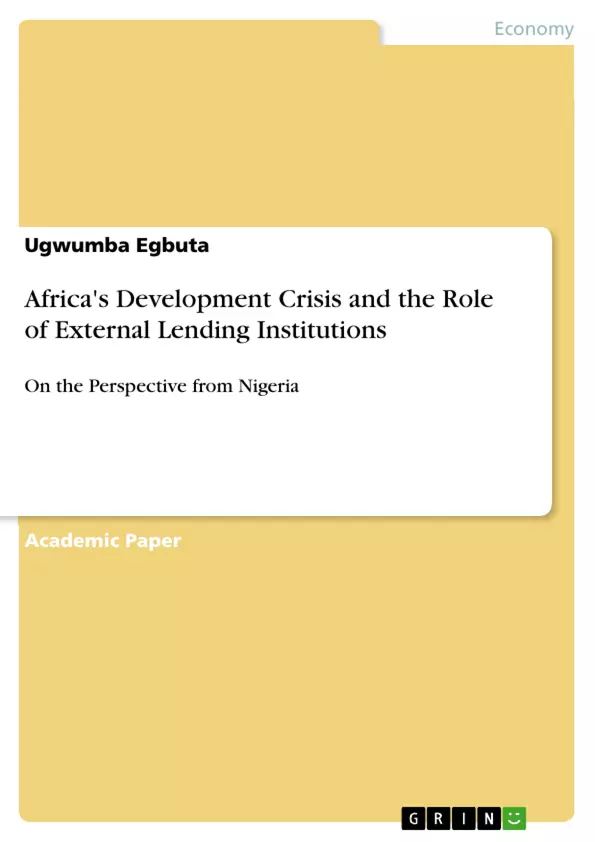This work analyzes Africa’s development crisis and the role of external lending institutions conerning the perspective in Nigeria. African countries came out of colonial rule with two major challenges related to achievement of sustainable development and unity in the continent. It decided to pursue unity which was a means to development. However, the prospects of development was inhibited or truncated by the outbreak of inter and intra-state conflicts that followed independence. To rebuild their economies, African countries resorted to borrowing from the Bretton Woods Institutions: the World Bank and the International Monetary Fund (IMF) and other international financial institutions. To this end, long and short-term loans were given to African leaders who either misapplied the facilities or could not cope with the conditionality associated with economic reform policies.
It is in this light that this article interrogates the undercurrents of these conditions attached to the loans on Africa, with insights from the Nigerian experience. It unravels how the application of the loans and the reform policies complicated rather than addressing the developmental malaise that bedevilled post-colonial African states for which the loans were sought for in the first instance. The article further questions the rationale behind the acceptance of these loans by African leaders and why it has consistently favoured borrowing as a means of solving the continent’s development challenges. It recommends, among other options, the evolvement of an alternative funding arrangement from within the continent devoid of external loan trappings.
More importantly, having an effective tax system devoid of corruption, purposeful political leadership that will manage the financial sector will help the nation avert similar trend in future. Through these, resources will come from diverse sources that will help the continent develop, since events of the past has proven that these institutions operate loan policies that are not favourable to the developing countries. Above all, efforts should be made to strengthen institutions of government, especially, the anti-corruption and crimes ones to bring about financial accountability regime.
Inhaltsverzeichnis (Table of Contents)
- Introduction
- The Development Philosophy of Bretton Woods Institutions
- Did SAP really underdeveloped Africa?
- Origins of Africa's Debt Crisis
Zielsetzung und Themenschwerpunkte (Objectives and Key Themes)
This article examines the impact of external lending institutions, particularly the World Bank and IMF, on Africa's development trajectory. It focuses on the Nigerian experience and explores the complexities of loan conditionalities, structural adjustment programs (SAPs), and their consequences for African economies. The article aims to analyze the reasons behind Africa's persistent reliance on external borrowing and recommend alternative funding arrangements.
- Impact of Bretton Woods Institutions on African development
- Analysis of structural adjustment programs (SAPs) and their consequences
- Exploring the roots of Africa's debt crisis
- Examining the rationale behind African leaders' acceptance of external loans
- Proposing alternative funding mechanisms for Africa's development
Zusammenfassung der Kapitel (Chapter Summaries)
The introduction sets the stage by highlighting Africa's post-colonial development challenges and its reliance on external lending institutions. It introduces the article's focus on Nigeria and the complexities of loan conditionalities.
Chapter 2 delves into the development philosophy of the World Bank and IMF, analyzing their origins, objectives, and the implementation of structural adjustment programs (SAPs). The chapter examines the impact of these programs on African economies and the consequences of premature integration into the global capitalist system.
Chapter 3 critically assesses the effectiveness of SAPs in addressing Africa's development challenges. It explores the arguments for and against these programs, highlighting their impact on Nigeria and the resulting social and economic malaise.
Chapter 4 examines the origins of Africa's debt crisis, tracing it back to the colonial legacy and post-independence challenges. It highlights the factors contributing to the continent's reliance on external borrowing and the complexities of achieving sustainable development.
Schlüsselwörter (Keywords)
The main keywords and focus topics of the text include: Bretton Woods Institutions, World Bank, IMF, loan, alternative funding, structural adjustment programs (SAPs), African development, debt crisis, Nigeria, economic reform policies, colonial legacy, global capitalist system, conditionality.
Frequently Asked Questions
What role did the World Bank and IMF play in Africa's development?
To rebuild their post-colonial economies, African countries borrowed from these institutions. However, the associated loan conditionalities and economic reform policies often complicated rather than addressed the developmental malaise.
What are Structural Adjustment Programs (SAPs)?
SAPs are economic reform policies attached to loans. In Nigeria and other African states, they often led to social and economic distress due to premature integration into the global capitalist system.
Why do African leaders continue to rely on external loans?
The article questions this rationale, suggesting that borrowing has been consistently favored as a short-term solution for long-term structural challenges inherited from the colonial era.
What are the recommendations to avert future debt crises?
Recommendations include evolving alternative funding from within Africa, strengthening anti-corruption institutions, and developing effective tax systems devoid of corruption.
How can financial accountability be improved in African states?
By strengthening government institutions, especially those dealing with crimes and corruption, and establishing a purposeful political leadership to manage the financial sector effectively.
- Citation du texte
- Ugwumba Egbuta (Auteur), 2019, Africa's Development Crisis and the Role of External Lending Institutions, Munich, GRIN Verlag, https://www.grin.com/document/461488



